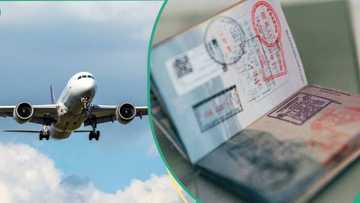New Zealand Changes Work Visa Rules to Ease Applications For Spouses of Foreign Students
- New Zealand has amended its immigration rules to allow partners and spouses of international students to qualify for work visas
- The new rule applies to international students enrolled in particular higher education programmes
- It also allows international students to apply for visas for their school-aged quickly children
Legit.ng’s Pascal Oparada has reported on tech, energy, stocks, investment and the economy for over a decade.
The government of New Zealand has revised its immigration rules, allowing partners and spouses of international students enrolled in particular higher education programmes to qualify for work visas.
The changes aim to make the country more attractive for students and their families by easing work eligibility criteria.

Source: Getty Images
New Zealand issues Green List
Under the new rule, spouses of students enrolled in some higher education schemes, especially those aligned with the country’s Green List, occupations are now eligible for visas.
PAY ATTENTION: Share your outstanding story with our editors! Please reach us through info@corp.legit.ng!
The new guidelines apply to spouses of students studying Level 7 or 8 qualifications, including graduate certificates, graduate diplomas, Bachelor’s degrees, postgraduate certificates, postgraduate diplomas, and Bachelors Honours degrees.
According to reports, the Green List identifies occupations in high demand in New Zealand.
Spouses and partners of students enrolled in the listed qualifications may now expedite their residency routes, potentially securing immediate residence or after two years of working in their qualified roles.
This update shows New Zealand’s commitment to attracting skilled talent and supporting the families of international students.
New Zealand to support student’s children with education
The new guideline makes it easier for students with valid visas to support various visa applications for their partners and dependent children.
Partners of students can apply for a “Partner of a Student Work Visa” if they are enrolled in an eligible Level 7 or 8 qualification as contained in the Green List.

Read also
“It allows you to stay “: France Simplify Residence Permit Renewal For Nigerians, other foreigners
The work visa gives open conditions, meaning applicants can apply for work visas without pre-existing job offers in the country. The new rule provides greater flexibility for visa holders to seek employment.
Programmes in the Green List
Reports say the updated Green List includes a comprehensive range of Bachelor’s degrees and Bachelor’s Honours qualifications that could lead to professional registration rather than meeting the country’s Qualifications Authority (NZQA) standards. It acknowledges the importance of specific qualifications that align with professional registrations required for some occupations.
Partners and spouses of the newly accessible work visas can also support their dependent school-aged children, allowing them to apply for a Dependent Child Student Visa.
The scheme treats the children as domestic students, exempting them from international tuition fees for attending school in the country.
New Zealand tightens work visa rule for AEWV
Legit.ng earlier reported that the New Zealand government introduced more restrictions on work visa rules, targeting specific categories of Accredited Work Visa (AEWV) holders to reduce partner child dependents.

Read also
Canadian province places limits on the number of family sponsorship visa applications for Nigerians
According to the Immigration New Zealand website, the new rule, individuals with AEWVs working in occupations categorised at levels 4 and 5 by the Australian and New Zealand Standard Classification of Occupations and who don’t have a pathway to residency are no longer required to support their partners and dependent children in applying for work, visitor, or student visas.
Quebec limits on the number of family visa sponsorship applications
Legit.ng previously reported that the Canadian province of Quebec has limited the number of family visa sponsorship applications, which analysts say could affect Nigerians and other immigrants.
Reports say that Quebec set a limit of 13,000 applications across several family sponsorship categories, effective June 26, 2024, until June 25, 2026.
The restriction states that 10,400 slots of the 13,000 applications are designated for spouses, common-law spouses, and dependent children aged 18 years and above.
PAY ATTENTION: Unlock the best of Legit.ng on Pinterest! Subscribe now and get your daily inspiration!
Source: Legit.ng


